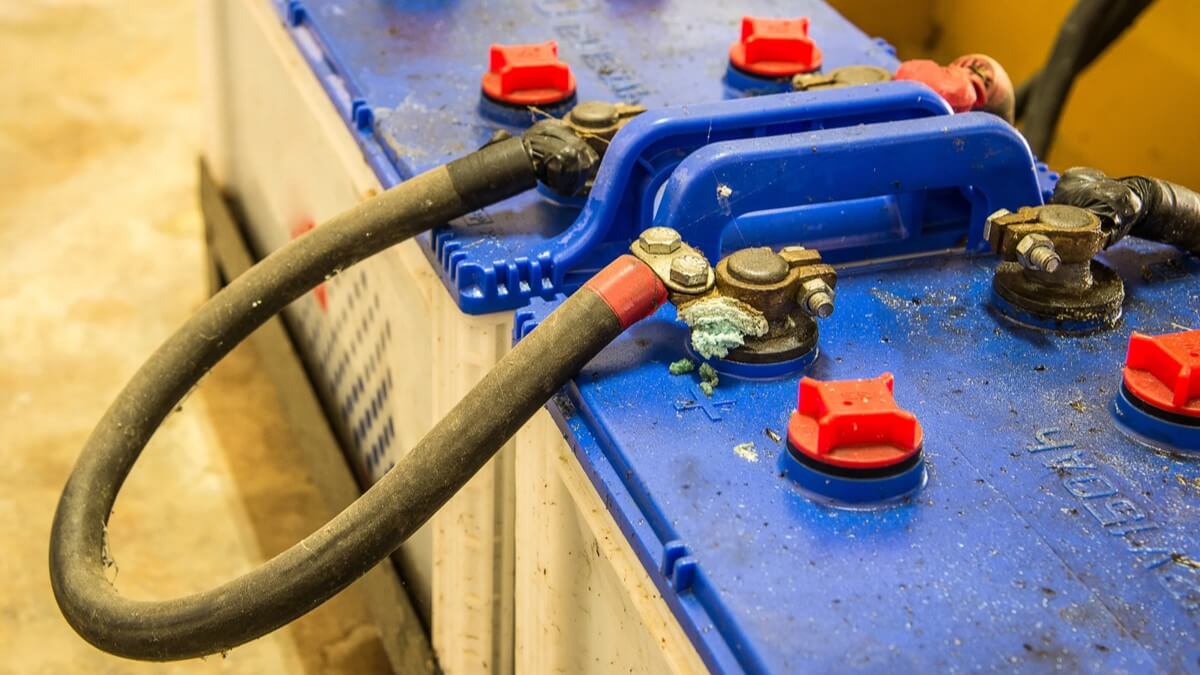In the world of battery maintenance, one term that often surfaces is battery sulfation.
Understanding what sulfated battery means, how it affects the performance of a battery, and ways to prevent it is crucial, especially for those working with lead-acid batteries in various applications such as cars, solar power systems, and uninterruptible power supplies (UPS).

A sulfated battery is a common issue that can lead to reduced efficiency, shorter lifespan, and even complete battery failure if left untreated.
What Is Battery Sulfation?
Sulfation is the accumulation of lead sulfate crystals on the battery’s lead plates, primarily in lead-acid batteries. Normally, when a battery discharges, sulfur molecules from the electrolyte (sulfuric acid) react with the lead in the plates, forming lead sulfate.
During recharging, this lead sulfate is typically reconverted back into lead and sulfuric acid, restoring the battery’s ability to store and release energy. However, when the battery remains discharged for extended periods or is consistently undercharged, the lead sulfate crystallizes and hardens. These hardened crystals inhibit the chemical reaction needed for proper charging and discharging, drastically reducing the battery’s capacity.
Types of Sulfation:
- Reversible Sulfation: This occurs when sulfate buildup is minor, and the battery can recover through proper charging-discharging cycles.
- Irreversible Sulfation: Over time, if the sulfate crystals are allowed to accumulate and harden, they become permanent, leading to the inability to restore the battery’s performance; irreversible to recover through proper charging-discharging cycles.
Causes of Battery Sulfation.
Sulfation generally occurs due to poor maintenance or suboptimal operating conditions. The most common causes include:
- Undercharging: When a battery is not fully charged, sulfation can begin. Lead sulfate forms during discharge, but if the battery isn’t charged back to 100%, some sulfate remains on the plates.
- Prolonged Discharge: Leaving a battery discharged for extended periods allows lead sulfate to crystallize, resulting in permanent sulfation.
- Low Electrolyte Levels: If the electrolyte (the sulfuric acid in the battery) levels drop too low, it leads to sulfation. This often happens due to evaporation or leaks.
- Overcharging: Ironically, charging a battery for too long or at too high a voltage can also lead to sulfate buildup by causing the electrolyte to evaporate.
- High Operating Temperatures: High temperatures increase the rate of chemical reactions inside the battery, accelerating sulfation if the battery is undercharged or not maintained.
Signs of a Sulfated Battery.
There are several signs that can indicate sulfation in a battery, including:
- Reduced Performance: The most obvious sign is a loss of battery performance. A sulfated battery will not hold a charge as well as it once did, or it may take longer to recharge.
- Shorter Runtime: If the battery is powering a device, you may notice that the device runs for shorter periods before needing to be recharged.
- Increased Charging Time: Sulfated batteries take longer to charge, as the lead sulfate crystals impede the chemical reaction required for charging.
- Visible Damage: In extreme cases, visible white sulfate crystals may appear on the battery terminals, indicating advanced sulfation.
How to Prevent Battery Sulfation?
Preventing sulfation is crucial to prolonging the life of lead-acid batteries. Below are effective methods to prevent sulfation:
- Regular Full Charging: Always charge lead-acid batteries to their full capacity. Avoid partial charging, as this can promote sulfate buildup over time.
- Maintain Proper Voltage: Use a reliable charging system that maintains the correct voltage for your battery type. Overcharging or undercharging can both cause problems.
- Trickle Charging: If you’re storing a battery for an extended period, use a trickle charger or battery maintainer to keep it topped up without overcharging.
- Monitor Battery Voltage: Keep an eye on the voltage levels, especially for batteries used in standby applications like solar or backup power systems. If the voltage drops below the recommended level, recharge the battery promptly.
- Avoid Deep Discharges: Lead-acid batteries are not designed to be discharged to very low levels. Regular deep discharges will accelerate sulfation.
- Additives: Some battery manufacturers or aftermarket companies offer chemical additives designed to reduce sulfate buildup. While the efficacy of these additives varies, they may be worth considering for large or critical battery systems.
- Desulfators: Desulfators are devices designed to remove sulfate buildup by sending electrical pulses into the battery. While they may not work in all cases, they can be useful for reversing early-stage sulfation.
Can a Sulfated Battery Be Recovered?
In some cases, yes. If the sulfation is not too advanced, a sulfated battery can often be recovered by subjecting it to an extended slow charge using a smart charger.
Smart chargers can detect battery condition and provide a controlled charge that may help dissolve the lead sulfate crystals.
For batteries with more severe sulfation, desulfators (also called pulse conditioners) can sometimes reverse the process by breaking up the lead sulfate crystals through high-frequency pulses. However, once sulfation becomes permanent and irreversible, the battery will no longer function properly and will need to be replaced.
Conclusion.
Battery sulfation is a common issue with lead-acid batteries that can significantly reduce performance and lifespan if not addressed. Regular maintenance, such as ensuring full charge cycles, avoiding deep discharges, and keeping electrolyte levels in check, can prevent sulfation. For those with sulfated batteries, it’s essential to act quickly to attempt recovery before the damage becomes irreversible. By understanding what sulfation is and how to prevent it, you can significantly extend the life of your lead-acid batteries and ensure they operate at peak performance for as long as possible.
Leave a Reply